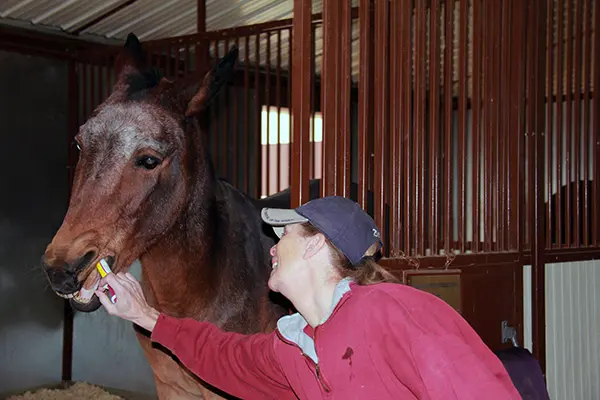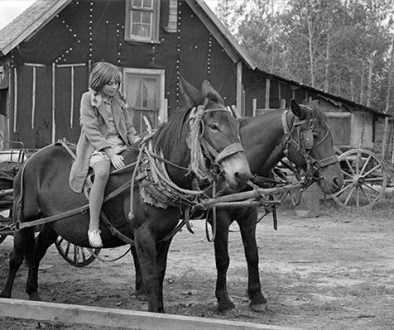MULE CROSSING: Insect Control
 Insect Control
Insect Control
Here is some information about insect control that you might find helpful! We worm our equines in January, March, May, July and September with Farnam Ivermectin and then break the cycle with Strongid in November to prevent internal worms and parasites. This insures that your animals are safe despite what your neighbors may be doing with their livestock. Fields and pastures should be harrowed in the spring and fall, and between hay cuttings. Keep all tack and equipment clean so it does not attract flies to your tack room and grooming area. Spray the tack room when you leave with a household flying insect spray for any residual flies.
- First and foremost, a regular grooming schedule at least every other week and preferably every week is essential for the
 hygiene and health of your equines. Regular grooming once a week to remove excess hair, mud, etc. will eliminate places on the animal, including legs that would be subject to insects laying eggs. If certain body areas begin to get sores, scabs, or bumps, use Neosporin, or if they are severe…Panalog, also called Animax or Dermalone (by prescription from your vet). Clean the eyes, ears and nostrils every time during grooming and fly spray the hairs inside the ears for the best bug-block after cleaning.
hygiene and health of your equines. Regular grooming once a week to remove excess hair, mud, etc. will eliminate places on the animal, including legs that would be subject to insects laying eggs. If certain body areas begin to get sores, scabs, or bumps, use Neosporin, or if they are severe…Panalog, also called Animax or Dermalone (by prescription from your vet). Clean the eyes, ears and nostrils every time during grooming and fly spray the hairs inside the ears for the best bug-block after cleaning. - We use Tri-Tech 14 by Farnam fly spray weekly for bugs and insects that can pester your equine. This seems to be the best and longest lasting spray (Herbal remedies and fly predators do not work as well!). Scrub flies and eggs from the legs, cover with Neosporin and then spray for flies during grooming. Using Johnson’s baby oil in the manes and tails helps to keep the flies at bay and will also discourage other animals from chewing on them.
- Use fly masks for those mules and donkeys that have sensitive skin. Farnam Super Masks will usually fit most animals. If you groom regularly and clean and spray the ear hairs, the eared masks may not be necessary (I have never had to use the ones with ears). You can find them in most tack and vet stores. Just make sure when you put them on that they will come off easily if they were to get caught on anything.
- Feeding the right kinds of feed for mules and donkeys. Animals are sweating toxins are more apt to attract insects.
 In order to keep flies and other insects under control, all stalls, runs and pens need to be kept free of manure and debris daily. Barns should be cleaned periodically with disinfectant. Keep all stalls, pens and sheds free of urine and manure (clean at least once a day, every day!). This includes larger dirt pen turnout areas weekly. You shouldn’t need to use any PDZ or chemicals at all if cleaned properly. For good drainage in stalls, we drill a 2’ x 4’ deep hole in the middle of the stall and fill it with 1 ½” rock. Then we put down 4” of pea gravel throughout the whole stall and cover with rubber mats.
In order to keep flies and other insects under control, all stalls, runs and pens need to be kept free of manure and debris daily. Barns should be cleaned periodically with disinfectant. Keep all stalls, pens and sheds free of urine and manure (clean at least once a day, every day!). This includes larger dirt pen turnout areas weekly. You shouldn’t need to use any PDZ or chemicals at all if cleaned properly. For good drainage in stalls, we drill a 2’ x 4’ deep hole in the middle of the stall and fill it with 1 ½” rock. Then we put down 4” of pea gravel throughout the whole stall and cover with rubber mats.- Keep manure collection piles well away from the house and barns (We put manure into a dumpster behind our hay barn and have it hauled away weekly). Contrary to popular belief, the manure is NOT suitable for fertilizer unless it is properly composted and used for appropriate crops. Equines consume weeds and poop seeds that will propagate weeds anywhere that the manure is used.
- Keep water sources clean. Check them daily, or clean as needed.
 Clean any manure from shed or stall walls daily. Power wash stall walls and alleyways as needed.
Clean any manure from shed or stall walls daily. Power wash stall walls and alleyways as needed.- Ceiling fans will also help a lot, both pointed into specific stalls and along the top of your barn alleyways! Just be sure to check them regularly and clean them as needed to prevent any spontaneous fires from dust gathering in them. Keep them running so birds will not build nests on them!
- Do not ever clip the hair inside the ears or muzzle hairs of the equines! Body clip only if you are showing. Use blankets and fly sheets as needed. Their hair coats will insulate them from the heat, cold and protect them from insects.
- Do not clip the hair on the legs unless you absolutely must for showing! Lots of times, you can get a clean look by using the clippers with the hair rather than against the hair on the legs to maintain protection.
- Keeping your fence lines free of weeds will also help enormously! Bugs and insects like to live in those areas!


© 2021, 2024 Lucky Three Ranch, Inc. All Rights Reserved.

 hygiene and health of your equines. Regular grooming once a week to remove excess hair, mud, etc. will eliminate places on the animal, including legs that would be subject to insects laying eggs. If certain body areas begin to get sores, scabs, or bumps, use Neosporin, or if they are severe…Panalog, also called Animax or Dermalone (by prescription from your vet). Clean the eyes, ears and nostrils every time during grooming and fly spray the hairs inside the ears for the best bug-block after cleaning.
hygiene and health of your equines. Regular grooming once a week to remove excess hair, mud, etc. will eliminate places on the animal, including legs that would be subject to insects laying eggs. If certain body areas begin to get sores, scabs, or bumps, use Neosporin, or if they are severe…Panalog, also called Animax or Dermalone (by prescription from your vet). Clean the eyes, ears and nostrils every time during grooming and fly spray the hairs inside the ears for the best bug-block after cleaning. In order to keep flies and other insects under control, all stalls, runs and pens need to be kept free of manure and debris daily. Barns should be cleaned periodically with disinfectant. Keep all stalls, pens and sheds free of urine and manure (clean at least once a day, every day!). This includes larger dirt pen turnout areas weekly. You shouldn’t need to use any PDZ or chemicals at all if cleaned properly. For good drainage in stalls, we drill a 2’ x 4’ deep hole in the middle of the stall and fill it with 1 ½” rock. Then we put down 4” of pea gravel throughout the whole stall and cover with rubber mats.
In order to keep flies and other insects under control, all stalls, runs and pens need to be kept free of manure and debris daily. Barns should be cleaned periodically with disinfectant. Keep all stalls, pens and sheds free of urine and manure (clean at least once a day, every day!). This includes larger dirt pen turnout areas weekly. You shouldn’t need to use any PDZ or chemicals at all if cleaned properly. For good drainage in stalls, we drill a 2’ x 4’ deep hole in the middle of the stall and fill it with 1 ½” rock. Then we put down 4” of pea gravel throughout the whole stall and cover with rubber mats. Clean any manure from shed or stall walls daily. Power wash stall walls and alleyways as needed.
Clean any manure from shed or stall walls daily. Power wash stall walls and alleyways as needed.

